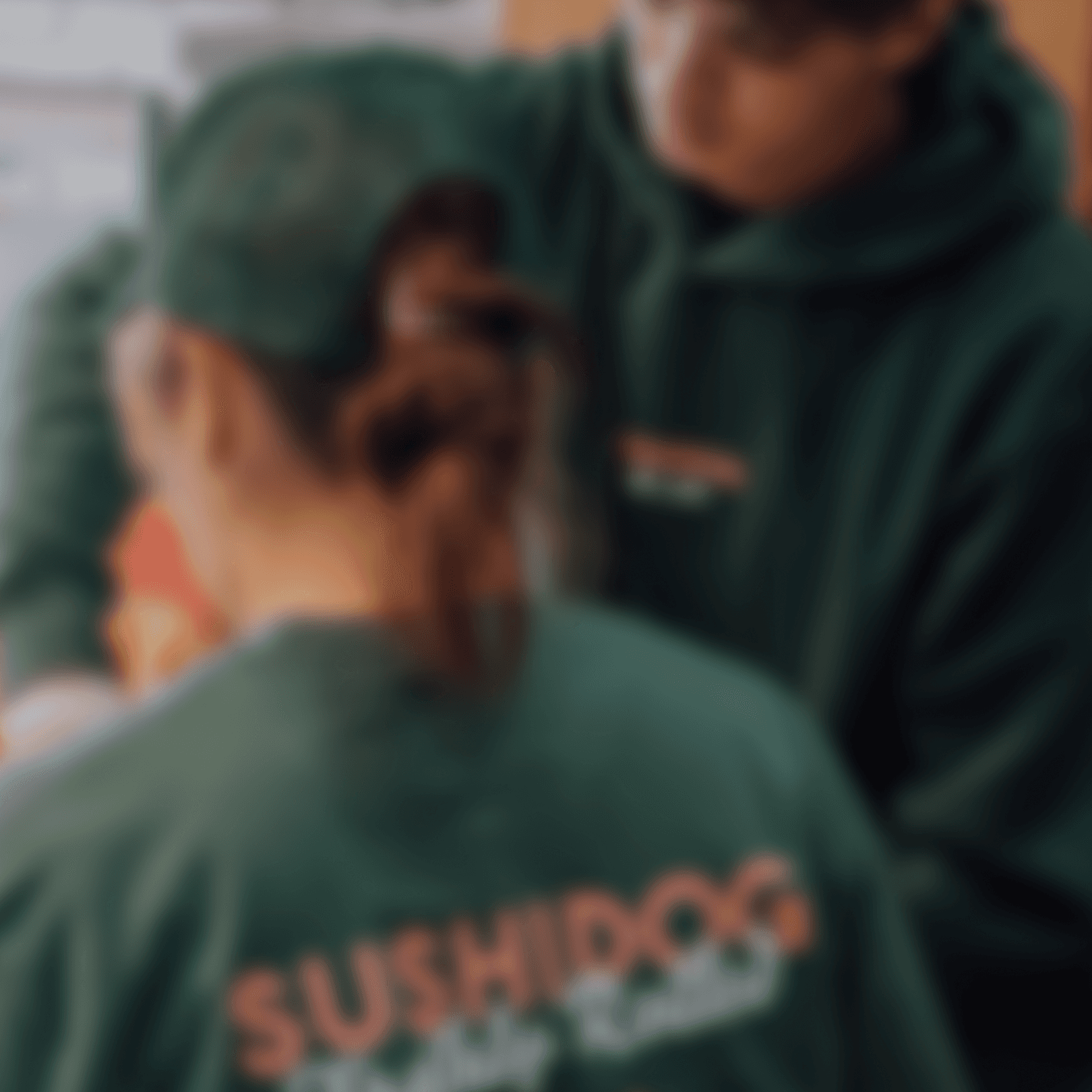October 13, 2025
– 6 minute read
Discover how Experimental Loyalty programs turn customers into advocates through memorable experiences, VIP perks, and personalized engagement for lasting loyalty.

Cormac O’Sullivan
Author
The old way of loyalty programs, mostly giving points or discounts, is not enough to keep customers connected. Experimental loyalty focuses on experiences, giving customers memorable moments that grow brand loyalty and customer engagement.
From access to exclusive events to personalized adventures, these programs help loyal customers feel an emotional connection and keep coming back. Experimental loyalty works well for long-term loyalty but needs careful planning. If done badly, it can have the opposite effect. Successful brands mix creativity, personalization, and customer service to turn normal interactions into unique experiences.
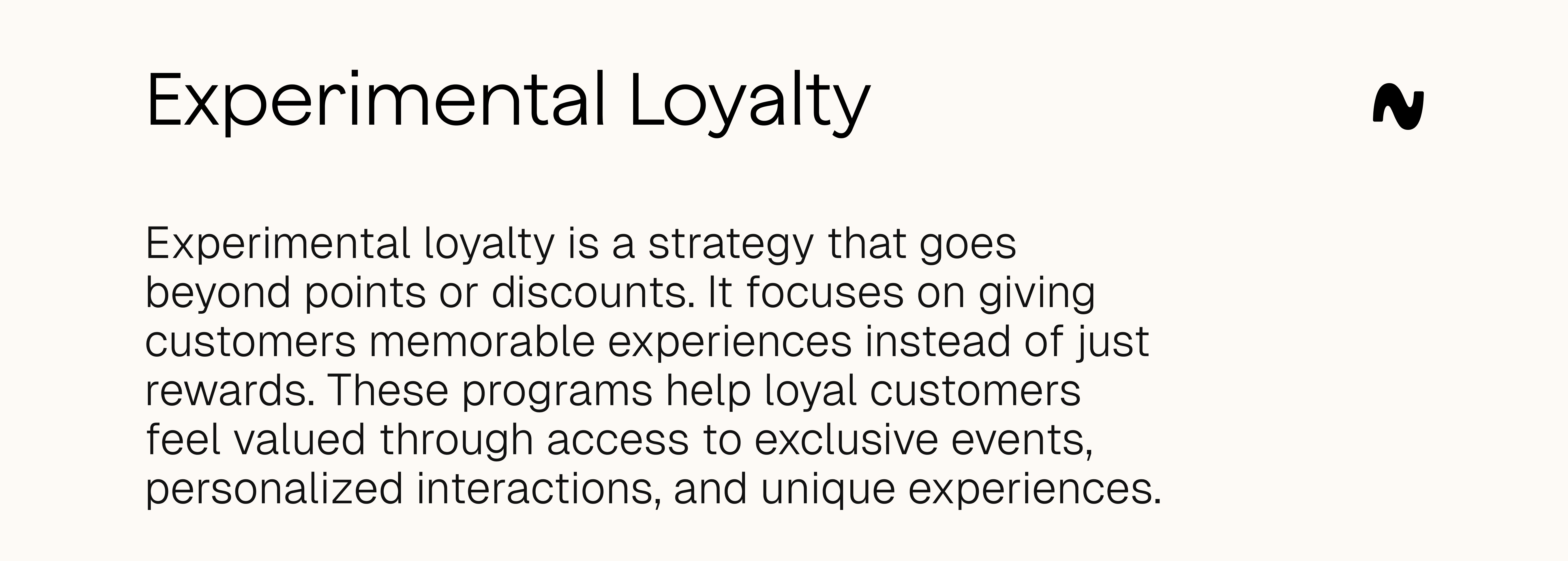
What is Experimental Loyalty?
Experimental loyalty is a strategy that goes beyond points or discounts. It focuses on giving customers memorable experiences instead of just rewards. These programs help loyal customers feel valued through access to exclusive events, personalized interactions, and unique experiences.
By creating an emotional connection, brands encourage repeat purchase and better customer engagement, turning customers into advocates. Experimental loyalty programs work well for brand loyalty but can be expensive and hard to manage. Success needs careful planning to make sure experiences are meaningful, easy to enjoy, and fit the brand and customers’ expectations.
Traditional Loyalty vs. Experiential Loyalty
Traditional Loyalty Programs
Traditional loyalty programs revolve around collecting points, redeeming coupons, or receiving discounts. They are straightforward, cost-effective, and scalable. However, they often reduce customer relationships to transactional exchanges.
Experiential Loyalty Programs
In contrast, experiential loyalty programs focus on creating emotional connections. This could mean offering special events, VIP treatment, or curated moments tailored to customer preferences. For instance, The North Face XPLR Pass offers outdoor adventure experiences, tapping into lifestyle and passion rather than just spending habits.
How Brands Deliver Experiential Loyalty
Delivering experimental loyalty is more than giving points or discounts. It’s about creating experiences that make customers feel valued, understood, and emotionally connected to a brand. Successful programs focus on immersion, access to exclusive events, and personalization, encouraging repeat purchase and strong customer engagement.
VIP Treatment Through Privilege-Based Rewards
One of the best strategies is giving privilege-based rewards. This can include early access to products, priority customer service, or free shipping for loyal members. These rewards make customers feel special and appreciated, boosting satisfaction and brand loyalty.
For example, beauty brands like Sephora’s Beauty Insider program give early access to new products, creating excitement and a sense of exclusivity. But these programs need careful management to avoid upsetting regular customers who do not get VIP benefits.
Access to Exclusive Events and Communities
Brands also build loyalty through access to exclusive events and communities. From private workshops to online forums, these programs let customers connect with the brand and other fans. For example, the Harley-Davidson Owners Group organizes rides, community events, and sporting events, giving members a sense of belonging.
These experiences boost emotional connection and encourage social media sharing, increasing the brand’s presence. The challenge is to make sure these events are easy to join, well-organized, and rewarding for participants.
Creating Personalized Brand Experiences
Personalization is key to experimental loyalty. Experiences like curated product recommendations or one-on-one consultations make customers feel seen and valued. Luxury and lifestyle brands often use data to create experiences that match individual preferences.
For example, fashion brands may offer private styling sessions or access to exclusive VIP previews. Personalization can strengthen customer engagement, but it needs careful use of customer data and good planning to work well.
Thrilling Adventure and Fun Experiences
Some brands focus on adventure and entertainment to create lasting memories. Outdoor and sports brands like The North Face XPLR Pass offer hiking trips, guided climbs, or access to exclusive sporting events, turning products into unique experiences.
These activities boost brand loyalty and give customers stories to share, increasing brand advocacy. The main challenge is cost experiential adventures need a lot of investment and can be hard to scale for many customers.
Luxury Experiences Deliver Indulgence at Its Finest
High-end brands use indulgent experiences to build prestige and brand loyalty. Programs like Hugo Boss Experience or Marriott Bonvoy Moments offer VIP events, luxury retreats, or exclusive tastings.
These experiences create emotional connection and make customers feel privileged. Luxury experiences can boost customer engagement, but brands must balance exclusivity with accessibility so enough customers can take part.
How Brands Benefit by Implementing an Experiential Loyalty Program
Implementing an experimental loyalty program offers brands far more than traditional rewards. By prioritizing emotional connection and unique experiences over simple transactions, businesses can achieve deeper customer engagement, stronger advocacy, and long-term loyalty.
Emotional Connection Fosters Loyalty That Turns Customers Into Advocates
At the heart of experimental loyalty is creating an emotional connection. When customers feel valued through personalized experiences, VIP treatment, or access to exclusive events they are more likely to feel attached to the brand. This bond encourages repeat purchase and turns loyal customers into advocates who share their experiences with friends, family, and on social media.
Brands that focus on meaningful moments often see higher customer engagement and more referrals. But building these connections needs consistent, authentic experiences that match customer values.
A Competitive Edge Positions Your Brand Ahead of Rivals
In crowded markets, standing out is important. Experiential loyalty programs give brands an advantage by offering more than points or discounts. Programs that include access to exclusive communities, adventure activities, or luxury experiences are hard for competitors to copy, making your brand memorable.
For example, programs like The North Face XPLR Pass or Harley-Davidson Owners Group combine community and adventure, creating experiences that strengthen loyalty. The challenge is staying innovative; brands must keep updating experiences to stay ahead and keep customer engagement high.
Long-Term Loyalty Keeps Customers Returning Again and Again
Traditional loyalty programs often focus on short-term rewards, but experiential programs build long-term loyalty. By offering meaningful experiences, brands keep customers coming back not just for transactions but for the experiences themselves.
This approach increases repeat purchase and keeps customer engagement high, which can boost lifetime customer value. Programs that combine point-based loyalty with experiential elements appeal to both rewards and emotional connection.
Higher Engagement Drives Active Participation and Stronger Relationships
Experiential loyalty increases customer engagement by giving people reasons to interact beyond buying. Joining community events, VIP experiences, or adventure activities strengthens the emotional connection between customers and the brand.
More engagement also helps brands get feedback, improve future offerings, and build stronger relationships with loyal customers. Managing different engagement channels can be tricky, but it creates a more active, invested customer base that supports long-term growth.
Top 5 Brands That Do Experiential Loyalty Well
Some of the most successful brands use experimental loyalty programs to increase customer engagement, build brand loyalty, and create memorable experiences. Here are five top examples:
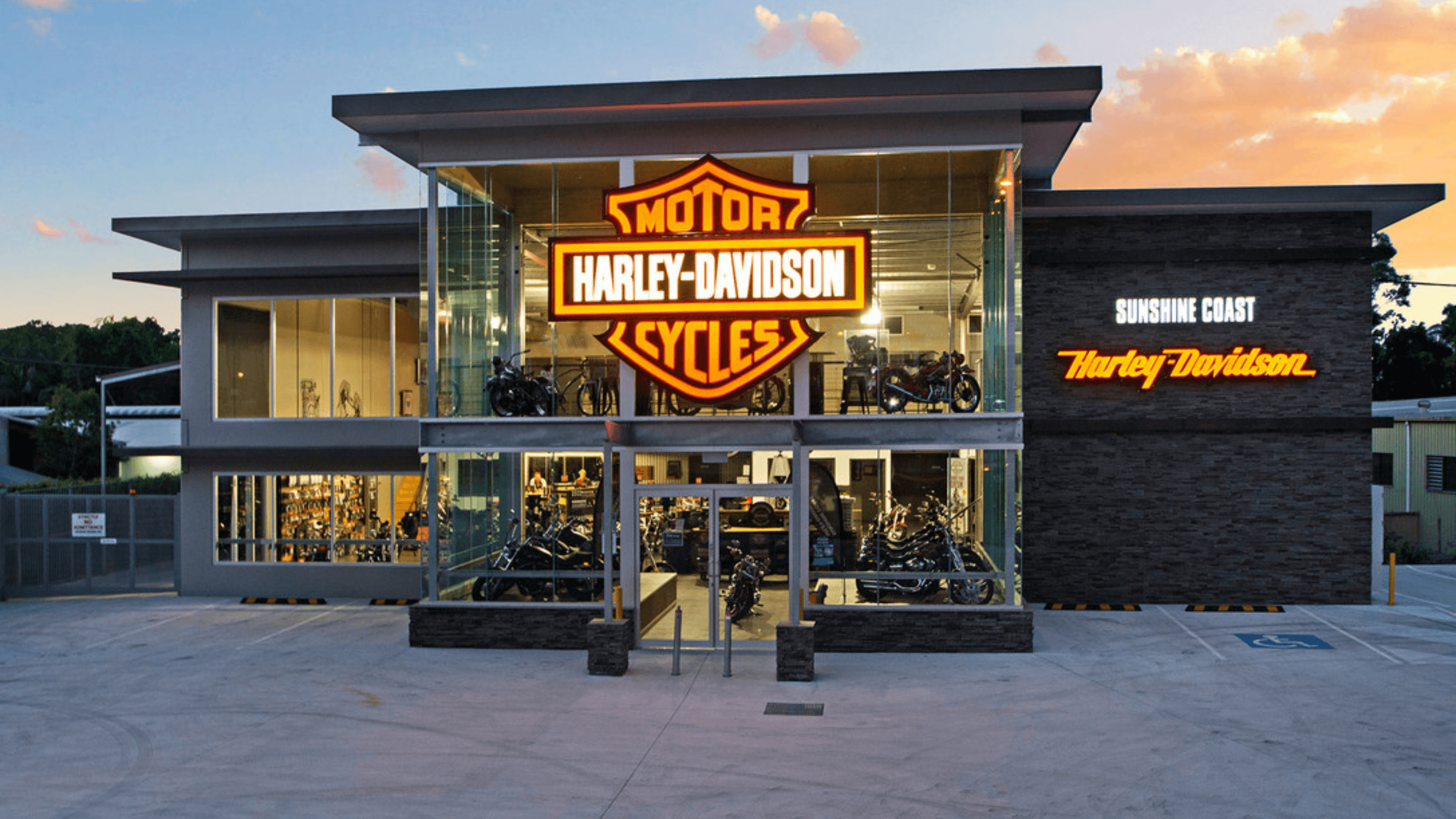
Harley-Davidson Owners Group
The Harley-Davidson Owners Group (H.O.G.) is a great example of experimental loyalty. Beyond selling motorcycles, Harley-Davidson builds community through organized rides, rallies, and local events. Members get access to exclusive communities where they can connect with other enthusiasts.
This mix of shared experiences and VIP treatment creates strong emotional connections, encourages repeat purchase, and turns riders into loyal brand advocates. The program needs a lot of investment in events and community management, but the reward in loyalty and advocacy is high.

Sephora – Beauty Insider
Sephora’s Beauty Insider program combines points-based and experiential loyalty. Members earn points and also get early access to product launches, invitations to VIP events, and personalized beauty recommendations.
These experiences make customers feel valued and encourage repeat purchase and ongoing engagement. The tiered system motivates members to reach higher levels to unlock more exclusive perks. The challenge is keeping personalization at scale so each experience feels special.
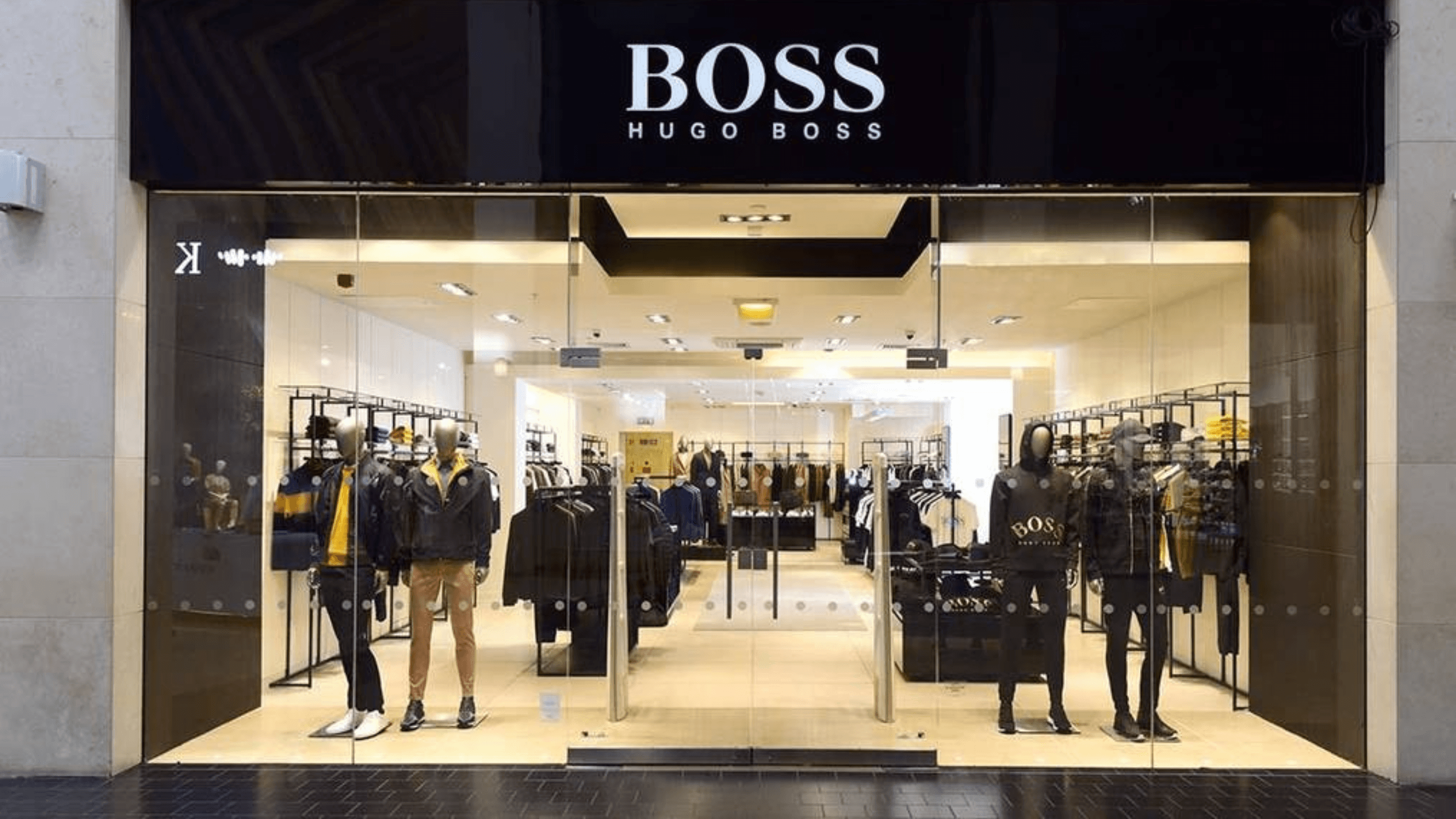
Hugo Boss Experience
The Hugo Boss Experience gives luxury customers special experiences like private shopping, exclusive fashion previews, and VIP events.
By offering personalized brand experiences, Hugo Boss creates moments that deepen emotional connection and boost the brand’s prestige. These rewards strengthen loyalty among high-value customers but need careful planning to balance exclusivity and accessibility.

The North Face XPLR Pass
The North Face XPLR Pass turns outdoor products into exciting adventures. Members get access to guided hikes, sporting events, and community challenges, making purchases into unique experiences.
These adventures build long-term loyalty by involving customers in shared activities, encouraging social sharing, and strengthening the brand’s identity. Adventure programs are very engaging but can be expensive and hard to scale for all customers.
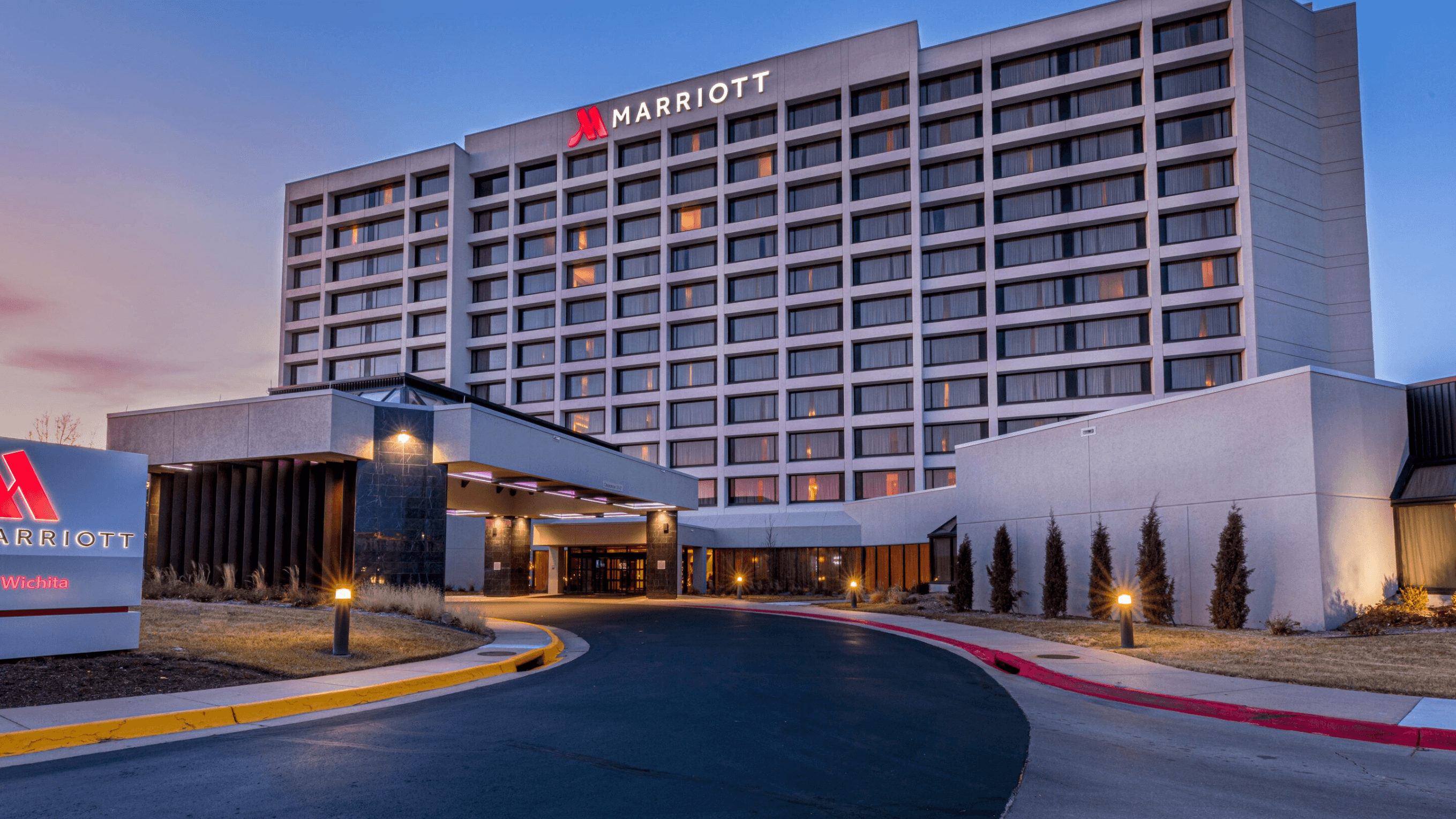
Marriott Bonvoy Moments
Marriott Bonvoy Moments improves travel loyalty by offering special experiences like culinary events, concerts, and VIP access to global attractions. By combining points-based loyalty with experiential rewards, Marriott builds emotional connections and encourages repeat stays.
These experiences boost customer engagement and advocacy, making the program feel more like a lifestyle than just a points system.
Conclusion
Experimental loyalty programs change how brands connect with customers, moving from points and discounts to memorable experiences and emotional connections. By offering VIP treatment, access to exclusive events, personalized moments, and adventure or luxury experiences, brands can grow brand loyalty, encourage repeat purchase, and build long-term advocacy.
These programs need careful planning and investment, but the reward is a more engaged, loyal customer base that supports growth and helps the brand stand out in competitive markets.



